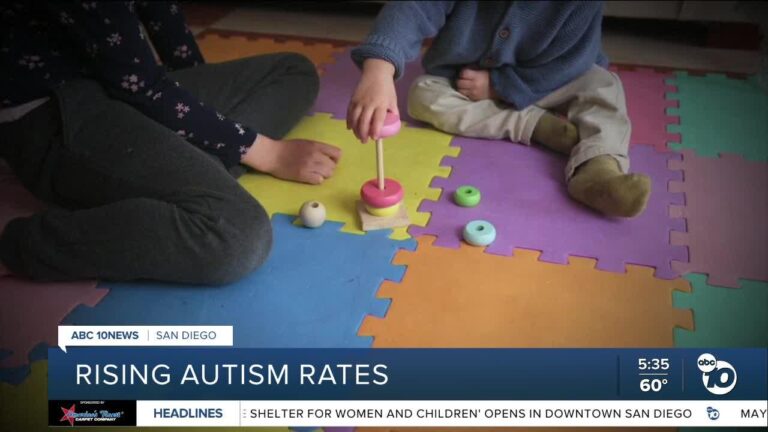Rising Autism Diagnoses in San Diego: Understanding the Trends and Community Response
San DiegoŌĆÖs Autism Prevalence Exceeds National Benchmarks
Recent analyses indicate that the incidence of autism spectrum disorder (ASD) in San Diego is significantly above the national average, prompting deeper investigation into the regionŌĆÖs unique contributing factors. Current statistics reveal that about 1 in every 44 children in San Diego receives an autism diagnosis, compared to the broader U.S. rate of 1 in 54 children. This notable increase emphasizes the pressing need for expanded healthcare and educational resources tailored to the neurodiverse population within the county.
Several elements are believed to influence this upward trend, including:
- Enhanced diagnostic accuracy and heightened awareness among local healthcare professionals
- Proximity to leading research institutions specializing in neurodevelopmental disorders
- Distinct environmental and demographic characteristics of the San Diego region
For clarity, the following table compares autism prevalence rates between San Diego County and the national average:
| Location | Autism Diagnosis Rate |
|---|---|
| San Diego County | 1 in 44 |
| United States (Overall) | 1 in 54 |
Key Drivers Behind the Increasing Autism Diagnoses in San Diego
The surge in autism identification within San Diego stems from a multifaceted set of influences. Foremost among these is the improved vigilance and training of healthcare providers and educators, who now implement more comprehensive early screening protocols. This proactive approach facilitates earlier detection of developmental differences, often during toddlerhood.
San DiegoŌĆÖs extensive network of specialized diagnostic centers and intervention programs also plays a crucial role by making assessments and therapies more accessible than in many other regions. Furthermore, the communityŌĆÖs strong advocacy for mental health awareness has helped reduce stigma, encouraging families to seek evaluations and support sooner.
Demographic factors further shape diagnosis rates. The countyŌĆÖs relatively affluent population tends to have greater access to healthcare services, which correlates with higher rates of autism identification. The table below summarizes some of the primary contributors influencing diagnosis frequency:
| Influencing Factor | Effect on Diagnosis |
|---|---|
| Early Childhood Screening | Improved early detection rates |
| Healthcare Service Availability | More comprehensive follow-up evaluations |
| Community Education and Advocacy | Increased family engagement and reduced stigma |
| Socioeconomic Status | Greater utilization of developmental support services |
Challenges and Adaptations in Healthcare and Education Systems
The escalating number of autism diagnoses has placed considerable pressure on San DiegoŌĆÖs healthcare and educational frameworks. Clinics specializing in neurodevelopmental disorders report a doubling in demand for diagnostic appointments and therapeutic interventions such as occupational, speech, and behavioral therapies over the past four years. This surge necessitates urgent expansion of both infrastructure and trained professionals to meet the communityŌĆÖs needs.
Schools throughout the county are also evolving to accommodate the growing population of students on the autism spectrum. Key responses include:
- Augmented funding directed toward special education programs
- Creation of individualized education plans (IEPs) tailored to each studentŌĆÖs strengths and challenges
- Enhanced professional development for educators focused on neurodiversity and inclusive teaching methods
- Collaborative partnerships between schools and healthcare providers to ensure integrated support
Despite these initiatives, gaps in resources and service availability remain, prompting advocacy groups to call for sustained investment and policy attention to guarantee equitable access for all families affected by autism.
| Service Type | 2019 Utilization | 2023 Utilization | Percentage Increase |
|---|---|---|---|
| Diagnostic Assessments | 1,200 | 2,600 | 117% |
| Therapeutic Sessions | 5,000 | 10,800 | 116% |
| Special Education Enrollment | 1,500 | 3,450 | 130% |
Comprehensive Support Systems for Families Impacted by Autism
Families in San Diego affected by autism have access to a broad spectrum of resources aimed at fostering development and easing caregiving challenges. Early intervention remains a critical focus, with evidence-based therapies such as Applied Behavior Analysis (ABA) and speech-language therapy widely available to enhance communication and social interaction skills.
Collaboration between educational institutions and community organizations ensures that children receive customized learning accommodations within inclusive environments. Additionally, parent-led support networks provide essential emotional support and practical guidance, creating a sense of community and shared experience.
To improve service navigation, San Diego County has recently bolstered its centralized resource platforms, offering both digital and in-person access points. Notable resources include:
- Integrated Autism Care Centers: Facilities offering coordinated medical, educational, and therapeutic services under one roof
- Respite Care Services: Temporary relief options for caregivers to prevent burnout and maintain family well-being
- Financial Support Programs: Grants and subsidies designed to offset the costs of ongoing therapies
- Educational Workshops: Training sessions empowering caregivers with strategies to support their childŌĆÖs growth
| Resource Category | Primary Advantage | Coverage Area |
|---|---|---|
| Early Intervention Services | Developmental skill enhancement for young children | County-wide |
| Parent Support Networks | Emotional support and shared knowledge | Multiple local communities |
| Financial Assistance Programs | Helps reduce therapy-related expenses | Accessible online |
Conclusion: Addressing the Growing Needs of San DiegoŌĆÖs Autism Community
As autism diagnosis rates in San Diego continue to outpace national averages, the data reported by 10News.com highlights an urgent call for enhanced support systems, early intervention initiatives, and ongoing research tailored to the regionŌĆÖs specific needs. Collaboration among public health officials, educators, healthcare providers, and community advocates will be essential to develop effective policies and expand resources. Monitoring these evolving trends closely will ensure that families affected by autism receive the comprehensive care and support necessary to thrive in San DiegoŌĆÖs dynamic environment.




